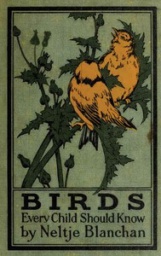

Birds Every Child Should Know (1907)
by Neltje Blanchan


If you want some jolly little neighbours for the summer, invite the wrens to live near you year after year by putting up small, one-family box-houses under the eaves of the barn, the cow-shed, or the chicken-house, on the grape arbour or in the orchard. Beware of a pair of nesting wrens in a box nailed against a piazza post: they beat any alarm clock for arousing the family at sunrise. Save the starch boxes, cover them with strips of bark, or give them two coats of paint to match the building they are to be nailed on. Cut a hole that you have marked on one end of each box by drawing a lead pencil around a silver quarter of a dollar. A larger hole would mean that English sparrows, who push themselves everywhere where not invited, would probably take possession of each house as fast as you nailed it up. Of course the little one-roomed cottages should have a number of small holes bored on the sides near the top to give the wrens plenty of fresh air. Have the boxes in place not later than the first of April -- then watch. Would it not be a pity for any would-be tenants to pass by your home because they could not find a house to let? Wrens really prefer boxes to the holes in stumps and trees they used to occupy before there were any white people with thoughtful children on this continent. But the little tots have been known to build in tin cans, coat pockets, old shoes, mittens, hats, glass jars, and even inside a human skull that a medical student hung out in the sun to bleach! When you are sound asleep some April morning, a tiny brown bird, just returned from a long visit south of the Carolinas, will probably alight on the perch in front of one of your boxes, peep in the doorhole, enter -- although his pert little cocked-up-tail has to be lowered to let him through -- look about with approval, go out, spring to the roof and pour out of his wee throat a gushing torrent of music. The song seems to bubble up faster than he can sing. "Foive notes to wanst" was an Irishman's description of it. After the wren's happy discovery of a place to live, his song will go off in a series of musical explosions all day long, now from the roof, now from the clothesposts, the fence, the barn, or the wood-pile. There never was a more tireless, spirited, brilliant singer. From the intensity of his feelings, he sometimes droops that expressive little tail of his, which is usually so erect and saucy.🏁
Global Leaderboard
| # | Player | Time | Duration | Accuracy | WPM | pp | ||
|---|---|---|---|---|---|---|---|---|
| 1 | ||||||||
| 2 | ||||||||
| 3 | ||||||||
| 4 | ||||||||
| 5 | ||||||||
| 6 | ||||||||
| 7 | ||||||||
| 8 | ||||||||
| 9 | ||||||||
| 10 |


If you want some jolly little neighbours for the summer, invite the wrens to live near you year after year by putting up small, one-family box-houses under the eaves of the barn, the cow-shed, or the chicken-house, on the grape arbour or in the orchard. Beware of a pair of nesting wrens in a box nailed against a piazza post: they beat any alarm clock for arousing the family at sunrise. Save the starch boxes, cover them with strips of bark, or give them two coats of paint to match the building they are to be nailed on. Cut a hole that you have marked on one end of each box by drawing a lead pencil around a silver quarter of a dollar. A larger hole would mean that English sparrows, who push themselves everywhere where not invited, would probably take possession of each house as fast as you nailed it up. Of course the little one-roomed cottages should have a number of small holes bored on the sides near the top to give the wrens plenty of fresh air. Have the boxes in place not later than the first of April -- then watch. Would it not be a pity for any would-be tenants to pass by your home because they could not find a house to let? Wrens really prefer boxes to the holes in stumps and trees they used to occupy before there were any white people with thoughtful children on this continent. But the little tots have been known to build in tin cans, coat pockets, old shoes, mittens, hats, glass jars, and even inside a human skull that a medical student hung out in the sun to bleach! When you are sound asleep some April morning, a tiny brown bird, just returned from a long visit south of the Carolinas, will probably alight on the perch in front of one of your boxes, peep in the doorhole, enter -- although his pert little cocked-up-tail has to be lowered to let him through -- look about with approval, go out, spring to the roof and pour out of his wee throat a gushing torrent of music. The song seems to bubble up faster than he can sing. "Foive notes to wanst" was an Irishman's description of it. After the wren's happy discovery of a place to live, his song will go off in a series of musical explosions all day long, now from the roof, now from the clothesposts, the fence, the barn, or the wood-pile. There never was a more tireless, spirited, brilliant singer. From the intensity of his feelings, he sometimes droops that expressive little tail of his, which is usually so erect and saucy.🏁
